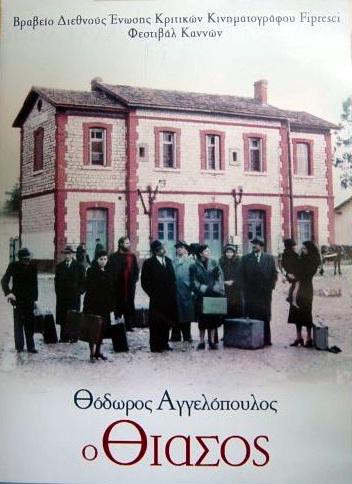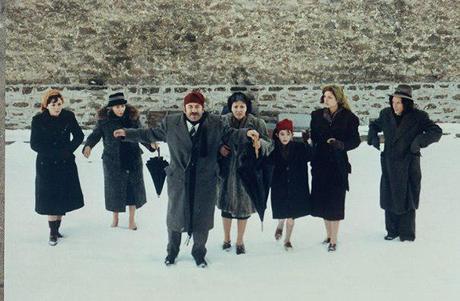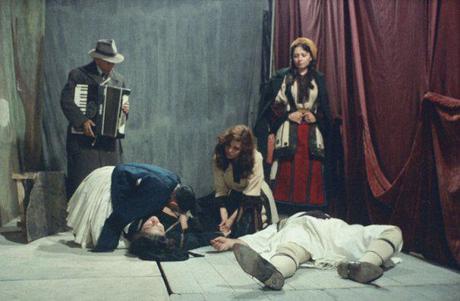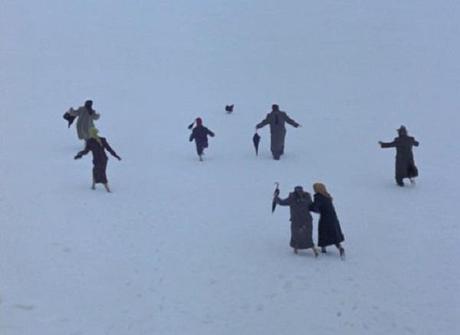
The Travelling Players (1975)
Director: Theo Angelopoulos
Cast: Petros Zarkadis, Vangelis Kazan, Eva Kotamanidou
Runtime: 230 minutes
My Rating: 8/10
Theo Angelopoulos’ The Travelling Players is a film that spans thirteen years over four hours, and covers so much history and politics many viewers will feel overwhelmed. I certainly did. The film is an epic in the best and most descriptive sense of the word. It spans all this time and does so seamlessly, cutting between years randomly and without warning. Almost all of its characters remain nameless, and their faces aren’t all that easy to remember, so at times it’s difficult to keep up, but I kept my eyes glued to the screen for the entire 230 minutes; Angelopoulos had me transfixed.

The film is the story of a troupe of actors traveling through Greece during and after World War II, performing a famous play called Golfo the Shepherdess. An interesting detail and also a slightly comic turn is that they never get the chance to perform the play in its entirety, due to various interruptions and/or distractions. In one unforgettable sequence, the play is interrupted by a murderous confrontation on stage that proves to be one of the film’s most poignant, powerful sequences. In another scene, their play is interrupted by the sound of bombs dropping, which remains, like other pertinent scenes in the film, off screen.
The plot of the film revolves chiefly around the relationship between the actors and how it is shaped by the war. One character, unnamed but credited as Agamemnon, tells a bitter and heartwrenching story of his journey as a refugee in the 1920s, and talks directly to the camera, one of three or four scenes where characters address the audience for an extended period of time. His pain and suffering is far from over, as he will be betrayed and led to death by a fellow player. The war breaks them all, and Angelopoulos uses long takes to show us everything in stark, glorious detail; the wintry snowfall, the elusive sunlight and the hazy blue sky and bitter seasonal air. Angelopoulos always seems to make his exterior locations look so forlorn and pale blue; it’s a common element in all three films of his I’ve seen so far.

If you’re going to make a film of such length as four hours, where plot turns and developments only occur once every ten minutes or so, you need to be able to keep the audience transfixed and interested all throughout. Angelopoulos does this with ease. Some viewers will find his long takes and seriously slow pace maddening and boring; I didn’t. I adored the way Angelopoulos allowed every single detail of the indoor scenes and outdoor sequences to soak up the screen. The film has a really theatrical feel, which is appropriate given its subject matter. In the scenes where characters address the camera for long monologues, we feel like we’re the audience of a play, being spoken to so directly and in such an involving way. This isn’t breaking the fourth wall so much as it is allowing us to learn more about the characters and their experiences, thus giving context to their actions, beliefs and choices.
There is not a single wasted moment in this entire film. I watched it from 11pm to 3am last night and was tired afterwards, but not for a second during. Sure, there are some slow sequences, and it is with some of these that the film is let down, but I was not particularly bothered and I enjoyed immensely the characters and the way Angelopoulos framed them in his long takes, sometimes static and sometimes moving. I learn there are only around eighty shots in the entire film; there feels like more, though you are conscious of the length of certain shots; many are impressive, most are just simple and last a while. So much of what makes many of the sequences in this film so powerful is the way they are shot; the cinematography by Giorgos Arvanitis, who would shoot most of Angelopoulos’ films and many others, is simply gorgeous and the work of a true artist. In the end it is Angelopoulos’ masterful artistry that shines through. He is a cinematic auteur of the first order, and his films, while often being slow and long, are always thought-provoking and inspiring. This, certainly his magnum opus, is a film that like the universe, is consistently expanding, the final whole of which is never quite clear but the sheer scope is simply stunning.


